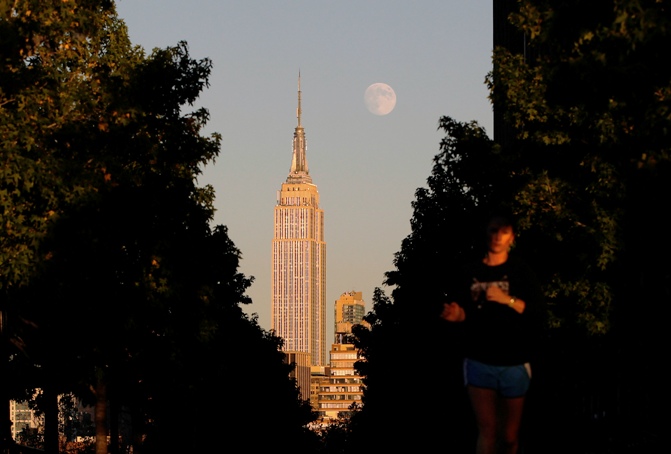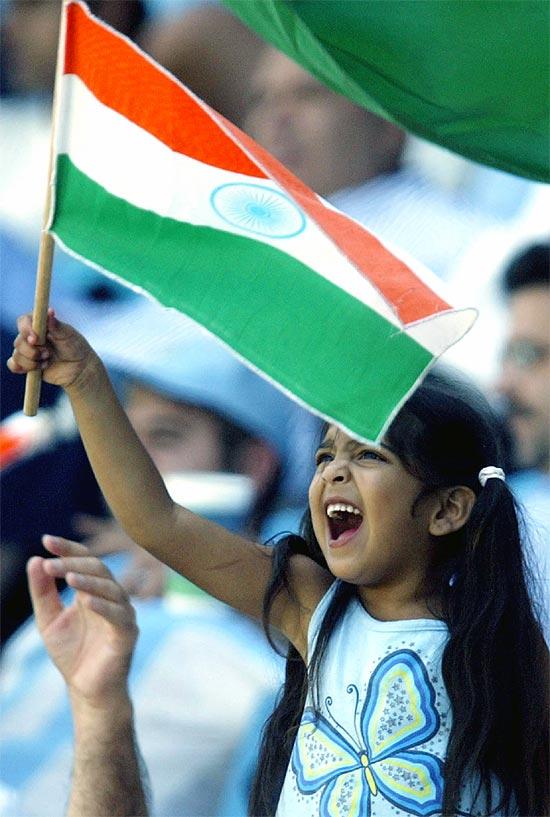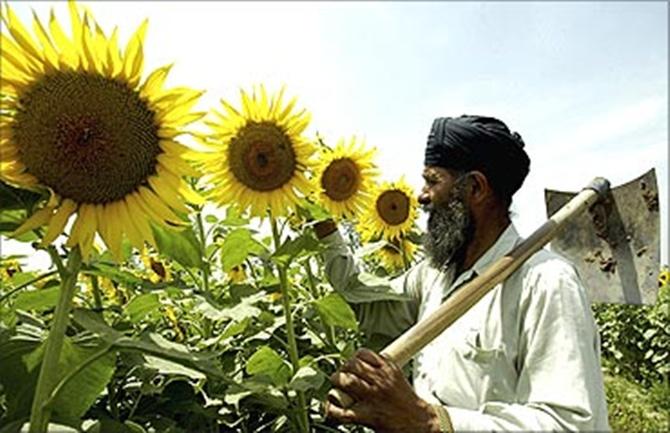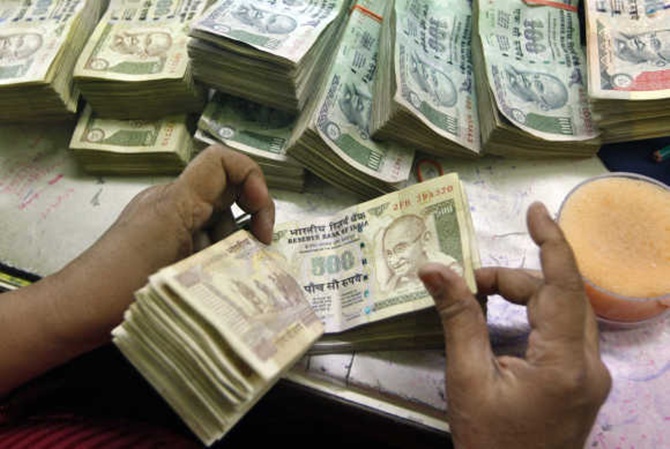This article was first published 11 years ago
Home »
Business » Will the New Year bring cheer to the economy?
Will the New Year bring cheer to the economy?
December 12, 2013 09:57 IST
Image: New York's World Trade Center
Photographs: Joe Woolhead. Courtesy, Silverstein Properties
The US economy will once again demonstrate its resilience and flexibility and grow around three per cent despite extremely fractious domestic politics over fiscal and other policies, says Shankar Acharya.
Yes, it’s that time of year when thoughts turn to what the New Year might bring.
Despite George Eliot’s admonition, “among all forms of mistake, prophecy is the most gratuitous”, here are a few speculations about 2014.
World: Economic/financial
- After two years of sluggish economic expansion, world growth is likely to improve to exceed three per cent (at market exchange rates). There will be five pillars for this enhanced performance.
- The US economy will once again demonstrate its resilience and flexibility and grow around three per cent despite extremely fractious domestic politics over fiscal and other policies.
- Belying some doubters, China will continue to grow at above seven per cent, an astonishing performance for a $9-trillion economy (compared to $16 trillion for the US, $17 trillion for the European Union and $6 trillion for Japan).
...
Image: A man rides Toyota Motor's one-seater 'i-unit' vehicle in Nagoya, Japan.
Photographs: Toshiyuki Aizawa/Reuters
- The Shinzo Abe policy-fuelled recovery in Japan will continue at around two per cent.
- The strong performance of North Asia will buoy the Southeast Asian economies, with Asean-5 (Indonesia, Thailand, Malaysia, the Philippines and Vietnam) expanding at near six per cent.
- The resurgence of sub-Saharan Africa will gather steam, with economic growth around six per cent.
- On the downside, the giant European economy will remain weighed down by high levels of public debt, banking problems, painful austerity programmes and the constraints of the single currency in the euro area. Overall growth may barely touch one per cent.
...
Photographs: Gary Hershorn/Reuters
- World growth will be strengthened by the improving energy balance in the US (thanks to the revolution in shale oil and gas, international oil prices might dip below $100/bbl for the first time in four years), and the exceptionally loose monetary policies of the US, Europe and Japan.
- World trade will recover from the doldrums of the past two years and expand faster than five per cent, helped by the recent World Trade Organisation accord at Bali.
- The long-feared “taper” in the US Federal Reserve’s quantitative easing will come and cause some turbulence in capital and currency markets, but without stalling global growth.
...
Image: New York's Empire State building
Photographs: Gary Hershorn/Reuters
World: Political/security
In contrast to this fairly sanguine outlook for the world economy, the prospects for global political and security developments are much more mixed.
- The dominance of the single superpower, the United States, will continue to weaken, hobbled by domestic political and fiscal constraints and increasingly challenged by the rising power of the Chinese giant. As the ongoing fracas over the People’s Republic of China’s unilateral announcement of its new air defence identification zone (ADIZ) showed, the US had to partially acknowledge China’s claim.
- As China’s economy continues to power ahead and with the new leadership and policy goals in place, its assertiveness in regional and global affairs is bound to increase, posing heightened security challenges for all neighbouring countries. The new year is likely to see sharpening clashes with Japan over the ADIZ, the Senkaku (Diaoyu) islands and other issues as rivalry in North Asia is played out.
- The US withdrawal from Afghanistan will happen and, despite a residual force and the billions poured into building an Afghan army and police, will provide space for the resurgence of Taliban forces in both Afghanistan and Pakistan. What toll this resurgence will take and where remains to be seen. Much will depend on the policies of neighbours: Pakistan, China, Russia, Iran and India.
- The Middle East (or West Asia, as we call it) will continue to suffer the travails of the aborted “Arab Spring”, not to mention the age-old Shia-Sunni rift. Syria will continue to bleed and Egypt’s “popular” military coup is unlikely to resolve deep and festering political fissures in the region’s most populous nation.
- The big new silver lining is the temporary agreement between the US-led nuclear weapon powers and Iran over the latter’s nuclear programme. If it can be converted into a final agreement during 2014, it would be a game-changer for the region in both political and economic dimensions. The odds are perhaps 50-50.
- There is also an outside chance of a US-sponsored Israeli-Palestine peace agreement in 2014, but disappointments of the past disallow much hope.
- Finally, there will be no meaningful global treaty on climate change.
...
Photographs: Arko Datta/Reuters
India: Political/security
Three days after the election results to five state Assemblies, politics is the flavour of the season. This “semi-final”, to use a popular term, has clearly been won by the Bharatiya Janata Party (BJP). And the Aam Aadmi Party (AAP) has made a spectacular debut in Delhi. What of the future?
- Despite talk about the general elections being held in February, the odds are they will be in April or May. So a new government of India will be sworn in perhaps end-May, five months from now. That’s a long time in politics. But it does seem probable that the next government will be a BJP-led coalition, with Narendra Modi as the prime minister.
- It may well have to tackle a great deal of complex, unfinished business relating to the creation of the new state of Telangana, the sharing arrangements for Hyderabad as a capital until a new one is built for Seemandhra, and so on.
- On the security side, a BJP-anchored coalition is likely to make serious efforts to rectify the weaknesses in defence capability that have accumulated in recent years, especially in a context of rising concerns and pressures on our northern and western borders.
- Furthermore, post-US-withdrawal Afghanistan and the possible return of a Bangladesh Nationalist Party government in Bangladesh will require greater vigilance against likely increases in cross-border terrorism.
- The new government will also need to consolidate the growing political and economic ties with Japan and Southeast Asia.
...
Photographs: Arko Datta/Reuters
India: Economic/financial
By the time a new government assumes office, almost half the calendar year will already be over.
The government will inherit a weak economy beset with multiple problems: slow growth (around five per cent annually), high consumer price inflation (about 10 per cent), high interest rates, lacklustre investment, large central government fiscal deficits (about six per cent of gross domestic product, or GDP), continuing pressures on external finances and the rupee (Rs 65-70 per US dollar), the rising fiscal claims of already legislated entitlement programmes, public sector banks with poor loan portfolios, serious infrastructure bottlenecks and grave and growing problems of unemployment and job scarcity — in short, “an in-tray from hell”.
...
Photographs: Arko Datta/Reuters
Even with serious efforts by the new government, the likely outcomes for 2014-15 in key dimensions may be as follows:
- Growth of GDP at 5.5 to six per cent.
- Average inflation in consumer prices at eight per cent.
- Central government fiscal deficit of five per cent of GDP.
- Current account deficit in the balance of payments at three per cent of GDP.
- Exchange rate of Rs 65-70 against the dollar.
If correct, these are not great numbers, but they would be an improvement on 2013-14. The real test will come in securing further advances in the years ahead.
Happy New Year!
(The writer is honorary professor at Icrier and former chief economic adviser to the Government of India. Views are personal.)
Source:







